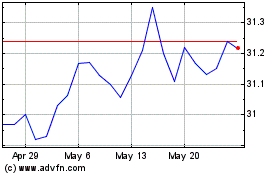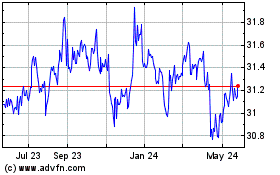ProShares Launches Merger Arbitrage ETF - ETF News And Commentary
December 13 2012 - 8:05AM
Zacks
After a roughly six month break, it appears as though ProShares
is back launching new products once more with the debut of its
Merger ETF (MRGR). This product marks the
13th launch for the company this year and just the
fourth non leveraged/inverse fund from the Maryland-based firm in
the 2012 time period.
Still, even though the fund does not utilize leverage, it is can
still be classified as a ‘long-short’ product due to its focus on a
merger arbitrage strategy. This technique looks to go long in firms
that have announced that they are a target for a takeover, while
simultaneously going short in the acquiring firms.
This approach looks to profit off of the spread between the
price that that target firm trades at after a deal has been
proposed, and the actual deal price that has been offered to the
target’s management and shareholders. This is a relatively riskless
way of obtaining a small profit, while it can also provide
investors with some uncorrelated returns, a great feature in
today’s market environment (read Two ETFs for the Muddle Through
Economy).
The new MRGR ETF looks to accomplish this task by following the
S&P Merger Arbitrage Index which is a benchmark that holds up
to 40 publically announced mergers or acquisitions in developed
countries around the globe. Additionally, the deals have to be at
least half a billion dollars, and liquidity must reach a level of
an average daily trading value of two million over the trailing
three month period.
Investors should also note that the benchmark only includes
deals that have an implied deal price at least 2% above the price
of the stock immediately following the deal announcement. The index
also includes a cash component of three-month T-bills, so it does
look to earn a small level of interest from this as well (see Time
for a Merger Arbitrage ETF?).
"The goal of MRGR is to produce consistent, positive returns
under virtually any market conditions," said Michael L. Sapir,
Chairman and CEO of ProShare Advisors LLC, ProShares' investment
advisor in a press release. "We are pleased to offer access to a
true merger arbitrage strategy delivered for the first time with
the cost efficiency, transparency and liquidity of an ETF."
MRGR in Focus
The ETF looks to charge investors 75 basis points a year for
this exposure, putting at the high end of ‘regular’ ETFs but well
in line for a product that utilizes some short exposure in its
approach. According to the ProShares site, consumer, industrial,
and energy firms comprise the bulk of the assets in the ETF,
leaving little for utilities, communication, and technology
firms.
Market cap exposure is tilted towards large caps, although
overall the product has a small and mid cap focus as securities
that are less than $5 billion in AUM account for nearly 40% of the
total. Meanwhile from a national look, American stocks comprise the
majority, but Canadian (19.7%), Asia—besides Japan—(19.7%), and
Europe—outside the UK-- (6.3%), account for nearly all the rest of
the assets.
ETF Competition
While this new product looks to give more access to the world of
merger arbitrage, we should point out that there is already a
merger arbitrage fund on the market. This product, from IndexIQ,
trades under the symbol of MNA and has been
tradable since November of 2009.
However, this ETF has failed to garner a significant amount of
assets in its three years on the market as the fund has just under
$15 million in AUM and volume below 10,000 shares a day. The fund
also has a significant cash component which has helped to
underperform broad markets in 2012, but also remain incredibly
stable and very capable of beating out the S&P 500 during bear
market periods (see Three Excellent Dividend ETFs for Safety and
Income).
Still, the fact that the product hasn’t seen much in inflows
over the past few years may suggest that there isn’t much ETF
investor interest in the space. Since fees are pretty comparable
among MNA and the newly launched MRGR, the battle for any new AUM
in the space will come down to performance and holdings.
Should MRGR be able to outperform, it may be able to make a name
for itself in the space, but it remains to be seen just how much in
assets that might mean for merger arbitrage ETFs, especially if the
economy continues to improve and investors look to long only
products instead of ‘hedged’ ones.
Want the latest recommendations from Zacks Investment Research?
Today, you can download 7 Best Stocks for the Next 30
Days. Click to get this free report >>
Follow @Eric Dutram on Twitter
IQ-MERGER ARB (MNA): ETF Research Reports
(MRGR): ETF Research Reports
To read this article on Zacks.com click here.
Zacks Investment Research
Want the latest recommendations from Zacks Investment Research?
Today, you can download 7 Best Stocks for the Next 30 Days. Click
to get this free report
IQ Merger Arbitrage ETF (AMEX:MNA)
Historical Stock Chart
From Jun 2024 to Jul 2024

IQ Merger Arbitrage ETF (AMEX:MNA)
Historical Stock Chart
From Jul 2023 to Jul 2024
